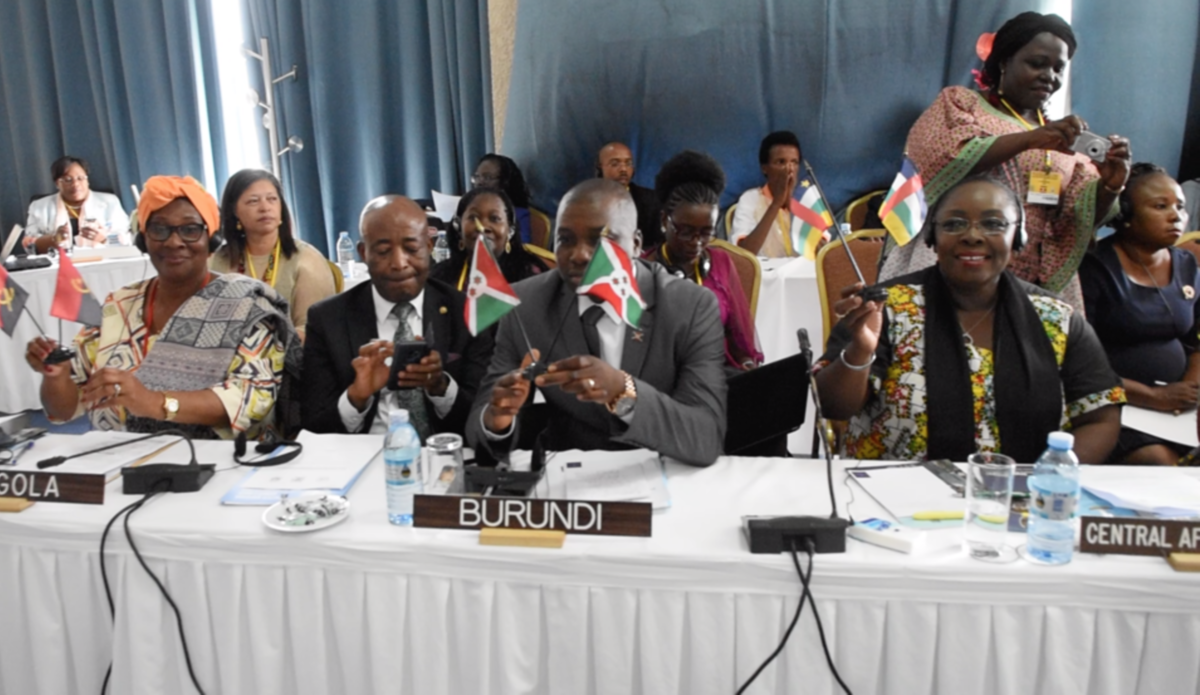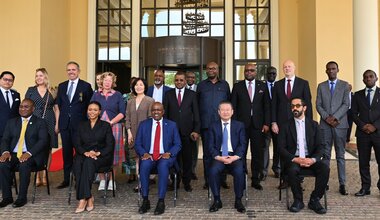Issues of gender, peace and security in the Great Lakes region at the centre of discussions in Entebbe, Uganda
Issues of gender, peace and security in the Great Lakes region at the centre of discussions in Entebbe, Uganda
Entebbe (Uganda), 23 November 2018 - Ministers of Gender of the Great Lakes region met today in Entebbe, Uganda, to discuss, endorse and move forward policy-related matters with regards to women’s participation in peace and dialogue processes in the region. This meeting comes on the heels of the 9th high-level meeting of the Regional Oversight Mechanism on 8 October in Uganda, where heads of State encouraged the countries of the region to continue to expand efforts to achieve full gender parity by 2023 and, in the interim, to ensure a minimum of 30% representation of women in peace and political processes. The event was co-organized by the Office of the Special Envoy of the Secretary-General for the Great Lakes region and the International Conference of the Great Lakes Region (ICGLR), in collaboration with the ICGLR Regional Training Facility (ICGLR-RTF) in Kampala, Uganda.
Key areas for discussion included the finalization of the Regional Action Plan to ensure immediate implementation, promotion of women’s participation in electoral and democratization processes, including peacebuilding efforts.
Threats to peace and security continue to haunt countries of the Great Lakes region of Africa. Causes of these occurrences are multiple and varied, but the root causes stem from a system of society, or government, in which men hold the power and women are largely excluded from it.
In the last two decades, there has been a concerted effort to identify and address the differential effects of conflict and violence on men, women, boys and girls. These efforts led the international community to collectively adopt the landmark United Nations Security Council Resolution 1325 (UNSCR 1325) on 31 October 2000. Since then, Governments of the Great Lakes region of Africa have taken various measures to address issues of women’s participation, their protection and the prevention of conflict as well as the promotion of peace.
Despite these efforts, progress is slow and uneven due to the complex political context of the Great Lakes region. Hence, the need and will to accelerate progress through a common action plan that will facilitate monitoring and measuring the state of implementation of UNSCR 1325.
Countries of the Great Lakes have also taken significant steps towards addressing gender disparities in the region. For example, legislation and policies in countries such as Angola, Kenya, Rwanda, Uganda, and Burundi expressly guarantee affirmative action to achieve gender parity in decision making bodies, including women occupying at least 30% of positions in those bodies.
Important efforts have also been made in achieving objectives of the ICGLR Pact on Security, Stability and Development, and the Peace, Security and Cooperation Framework for the Democratic Republic of the Congo (DRC) and the region, signed in 2006 and 2013 respectively. A Gender Policy is also in the process of being developed.
As part of its mandate, the Office of the United Nations Special Envoy for the Great Lakes region mainstreams gender as well as women, peace, and security perspective, in conflict-related sexual violence and has been collaborating on this front with the ICGLR and ICGLR-RTF based in Kampala. At the initiative of the Office of the Special Envoy, Joint solidarity missions were also undertaken by the UN, African Union, ICGLR and UNWOMEN in Burundi, Central African Republic, the DRC and South Sudan this year. Today’s high-level meeting brought together Gender ministers from six countries in the Great Lakes region and senior officials from the UN, AU, ICGLR and SADC. Among the top officials were Said Djinnit, UN Special Envoy for the Great Lakes region and Zachary Muburi-Muita, ICGLR Executive-Secretary.
 UN
UN





